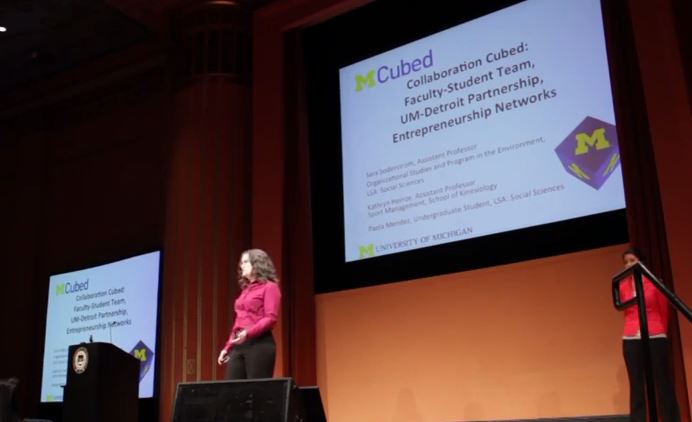BTN.com staff, January 3, 2015
The life of a professor involves much more than just teaching and writing papers for academic journals. A big part of their job entails seeking financial and institutional support for interesting, innovative research.
A new program at University of Michigan aims to take some of the red tape out of that often-cumbersome process and give professors and students more time to work together on new discoveries. Called MCubed, the program allows faculty from throughout the university to get fast funding for projects that would normally take years to get off the ground.
?The [funding] process is incredibly slow-paced compared to the speed of information nowadays,? said Mark Burns, an engineering professor and director of the MCubed program. ?Forty years ago, it didn?t matter, you had all sorts of time. Nowadays, when I publish a paper, a thousand people around the world can read it the same day. It?s a different world.?
Here?s how the program works: Faculty members in each school within the university get a token, worth $20,000. Anyone can propose projects on the MCubed Web site. If a particular professor likes a project, they can use their token to help fund it.
The catch? You have to find faculty in other departments to get on board with your proposal in order to earn a ?cube? - the program?s term for an approved project.
?Our goal was to spark innovative interdisciplinary research,? Burns said. ?It?s this crossing [of] boundaries that?s really interesting. As soon as I get my cube, I get $60,000 to start that same day. It totally circumvents this drudgery. Plus, it saves two years.?
While there is no formal review protocol for new projects, everyone can see everyone else?s proposals. That tends to make people judicious about what they submit.
?You have to put your project on a Web site with 2,100 of the smartest minds around,? Burns said. ?If you put a stupid project on the Web site, people will realize it very quickly.?
Initial funding for MCubed totaled around $14 million, which came from a combination of the provost, the deans of each UM school and college, and a significant number of faculty members.
?It has paid off because this seed money already has generated over $20 million [in revenue from projects],? Burns said. ?It allowed people to generate grants so much faster. This was just a small spark to get things going, and it really did.?
Burns said upwards of 200 projects have been funded to date, and every single one has been presented at an annual symposium.
?They all had to present, and we got to go there and see all these things they were doing,? Burns said. ?It was just amazing. It was gratifying.?
So, what kind of projects have been ?cubed?? A great example is ?In the Dark,? a multimedia event based on the principle of dark energy. A collaboration of faculty from the physics, art/design and music departments, it started with a computer simulation of a trip around the universe, then incorporated dance, video, digital imagery, music and art to provide a multi-sensory presentation.
?It began as this crazy idea I had,? said physics professor Gregory Tarle, who submitted the original plan for the project. ?I find things that are incredibly beautiful, but not [in] ways people will see traditional beauty. Physics people see things in numbers and data.?
So he pulled in colleagues from the arts and design programs at Michigan. The end result was a presentation displayed in a campus theater on a 180-degree screen that ran continuously for a week.
?When you got that immersive feeling, it was stunning,? Tarle said. ?People just started telling other people and they started showing up. Some members of the dance school came and they just started dancing to it.?
The project was so successful, it has already spawned a ?sequel? of sorts, which will be presented this spring.
[btn-post-package]?It?s an odd kind of project, but it worked out really well,? Tarle said. ?MCubed allowed me to do it, and I can?t imagine where else I could do something like this.?
The program is so popular that a ?2.0? iteration has been bankrolled for another two years, starting in Spring 2015. Additionally, it?s being expanded with the new MCubed Diamond program, which permits students to propose their own projects and allows donors from all over the world to provide funding for research initiatives they like. There are also plans to partner with other universities to fund similar programs, tapping even more academic minds.
As for the future of the program as a whole, Burns hopes this is just the beginning.
?I would like to see this as a permanent part of our university,? he said. ?It?s just a little bit of money compared to what we spend annually on research. It gives these novel concepts a place to grow.?
By Matthew Wood







